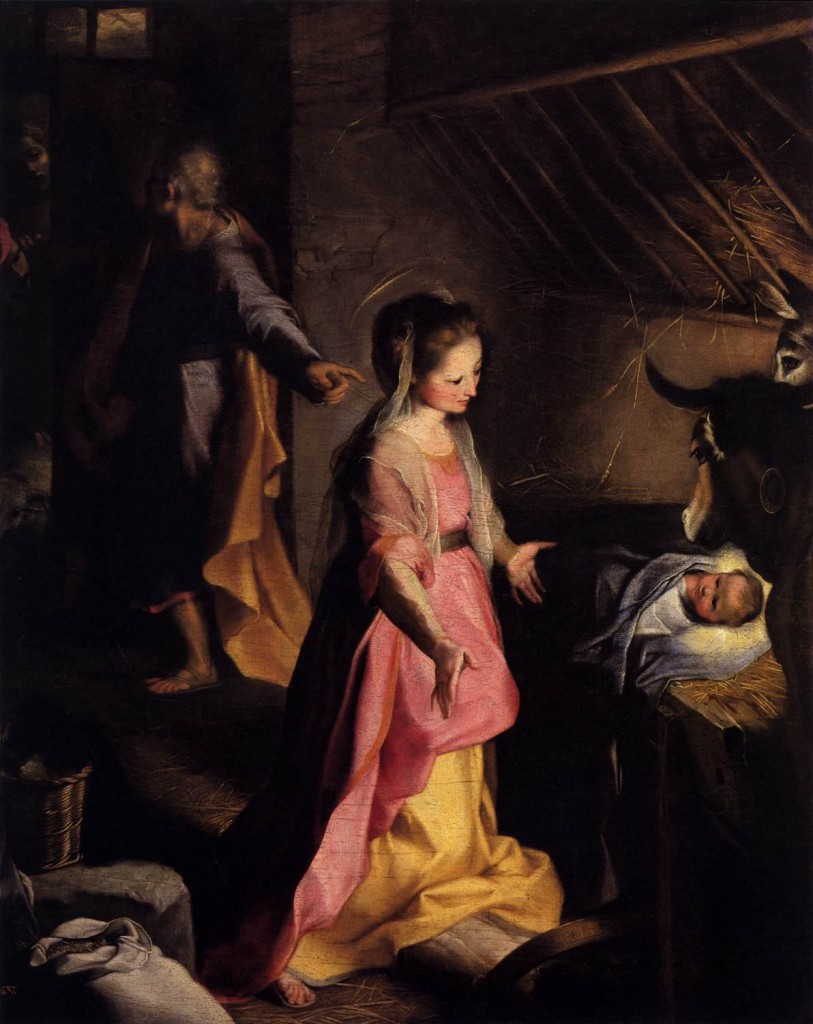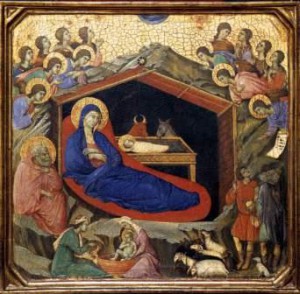 We continue our Patristic Rosary Project today with the:
We continue our Patristic Rosary Project today with the:
3rd Joyful Mystery: The Nativity
Christ came into the world in “the fullness of time” (Gal 4:4). His First Coming was foreseen from all eternity and His Nativity was prepared from the beginning of the history of our salvation. The manner of His birth is significant. St. Leo I, “the Great” (+461; whose Christmas sermons deserve entries apart!) wrote in a letter:
His God in that “all things were made through Him and nothing was made without Him.” (John 1:3) He is human in that He was “made from woman, made under the law”. The nativity of His flesh shows His human nature. The virgin birth is an indicator of His divine nature. [ep. to Flavian 4]
Commenting on Luke 2:5, Gaius Marius Victorinus (+IV c.), a teacher of St. Jerome, wrote:
As there is a fullness in things, so there is in time. For each thing has its fullness in a full and copious perfection that abounds in everything. Christ is the fullness of things. The fullness of times is the consummation of freedom. So that His fullness may be whole and perfect Christ collects His members who are scattered, and in this way His fullness is achieved. So in the same way the fullness of times was achieved when all had become ripe for faith and sins had increased to the utmost, so that a remedy was necessarily sought in the judgment of all things. Hence Christ came when the fullness of time was completed. [Epistle to the Galatians 2.4.3-4]
Using the same concept of Christ coming even in the fullness of man’s sins, St. Cyril of Alexandria (+444; ever the good Neoplatonist) states, in a Eucharistic fashion:
He found humanity reduced to the level of the beasts. Therefore He is placed like feed in a manger, that we, having left behind our carnal desires, might rise up to that degree of intelligence which befits human nature. Whereas we were brutish in soul, by now approaching the manger, yes, his table, we find no longer feed, but the bread from heaven, which is the body of life. [Commentary on Luke, s. 1]
St. Jerome, who spent so much of his time at Bethlehem, wrote:
He found no room in the Holy of Holies that shone with gold, precious stones, pure silk and silver. He is not born in the midst of gold and riches, but in the midst of dung, in a stable where our sins were filthier than the dung. He is born on a dunghill in order to lift up those who come from it: “From the dunghill he lifts up the poor.” (Ps 113:7 (112:7 LXX). [On the Nativity of the Lord]
One wonders if Jerome, perhaps still stinging from his being passed over in the splendors of Rome, didn’t spend a great deal of time reflecting on poverty and riches.
St. Ambrose of Milan (+397), the nobly-born and sophisticated bishop of enormously powerful Milan, whom Jerome disliked intensely, makes an observation about Christ’s humility and in a bright paen speaks of the forgiveness of those same black sins Jerome and Cyril went on about. This is simply gorgeous:
He was a baby and a child, so that you may be a perfect man. He was wrapped in saddling cloths so that you be freed from the snares of death. He was in a manger so that you may be in the altar. He was on earth that you may be in the stars. He had no other place in the inn so that you may have many mansions in the heavens. “He, being rich, became poor for your sakes that through His poverty you might be rich”. (2 Cor 8:9) Therefore His poverty is our inheritance, and the Lord’s weakness is our virture. He chose to lack for Himself that He may abound for all. The sobs of that appalling infancy cleanse me, those tears wash away my sins. Therefore, Lord Jesus, I owe more to your sufferings because I was redeemed than I do to works for which I was created…. You see that He is in swaddling clothes. You do not see that He is in heaven. You hear the cries of an infant, but you do not hear the lowing of an ox recognizing its Master, for the ox knows his Owner and the donkey his Master’s crib. [Exposition of the Gospel of Luke 2.41-42]
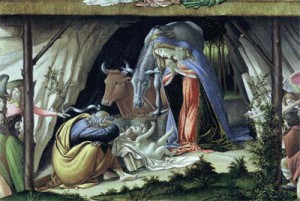 The eloquent Ambrose, not always original in his sources, is picking up imagery of the ox and ass, so commonly recognized by us as part of all our nativity scenes. It probably developed from a reference to Balaam’s ass in Scripture to which prophetic angel came (cf. Numbers 22). In the apocryphal and heterodox Proto-Gospel of James we also find the ox and ass.
The eloquent Ambrose, not always original in his sources, is picking up imagery of the ox and ass, so commonly recognized by us as part of all our nativity scenes. It probably developed from a reference to Balaam’s ass in Scripture to which prophetic angel came (cf. Numbers 22). In the apocryphal and heterodox Proto-Gospel of James we also find the ox and ass.
St. Francis of Assisi (+1226), whose feast we celebrate on 4 October, Francis was truly devoted to the Blessed Virgin. In a year we can’t determine he composed a salutation to Mary which he recited every day:
Hail Lady, Holy Queen, Holy Mary Theotokos, who are the Virgin made church · and the one chosen by the Most Holy Father of Heaven, whom He consecrated with His Most Holy Beloved Son and with the Holy Spirit, the Paraclete; · in whom there was and is all fullness of grace and every good. · Hail His Palace; Hail His Tabernacle; Hail His Home. · Hail His Vestment; Hail His Handmaid; Hail His Mother · and hail all you holy virtues, which through the grace and illumination of the Holy Spirit are infused into the hearts of the faithful, so that from those unfaithful you make them faithful to God.
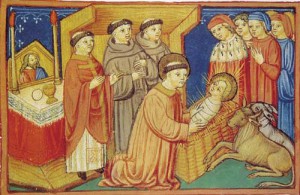 All that Mary was and came to be, she is in light of her Son, the Word made flesh, flesh from Mary. Francis was a great lover of the mystery of the Incarnation and Nativity. In 1223 in a cave near the tiny Italian hill town of Greccio, Francis “reenacted” the Nativity scene, bringing in a manger and straw and an ox and ass. There was a procession in the night of the Christmas Vigil with and Mass was celebrated. Francis had a vision of the infant Jesus and he held Him in his arms. At. my home parish of St. Agnes in St. Paul (MN) at midnight Mass there is a procession to the crib and one of the altar boys, dressed in a Franciscan habit, places the Christ Child in the manger. I am sure you have your own wonderful customs. I guess it doesn’t surprise me that secularists hate Christmas and Nativity scenes so much. Christmas calls for humility and simplicity, yielding and generosity.
All that Mary was and came to be, she is in light of her Son, the Word made flesh, flesh from Mary. Francis was a great lover of the mystery of the Incarnation and Nativity. In 1223 in a cave near the tiny Italian hill town of Greccio, Francis “reenacted” the Nativity scene, bringing in a manger and straw and an ox and ass. There was a procession in the night of the Christmas Vigil with and Mass was celebrated. Francis had a vision of the infant Jesus and he held Him in his arms. At. my home parish of St. Agnes in St. Paul (MN) at midnight Mass there is a procession to the crib and one of the altar boys, dressed in a Franciscan habit, places the Christ Child in the manger. I am sure you have your own wonderful customs. I guess it doesn’t surprise me that secularists hate Christmas and Nativity scenes so much. Christmas calls for humility and simplicity, yielding and generosity.
What an amazing thing it is to consider how the eternal Word, through whom all things were made, was made so very small. Interestingly, it was also in 1223 that Francis had put together the ninth chapter of Rule in which he concerns himself with the verbum abbreviatum. His brothers were to speak with brief words because the Lord Himself became a verbum abbreviatum. How consistent this is with the adage attributed (wrongly) to Francis that we should always be preaching the Gospel, and sometimes even use words.
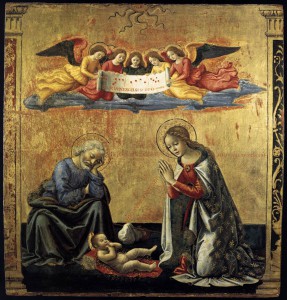 So much of our Christian life should be rooted in simplicity. Jerome again, Doctor Cantankerus as patristiblogger Mike dubbed him, makes a wonderful point aimed at us who spend our time in lofty books:
So much of our Christian life should be rooted in simplicity. Jerome again, Doctor Cantankerus as patristiblogger Mike dubbed him, makes a wonderful point aimed at us who spend our time in lofty books:
The Lord is born on earth, and He does not even have a cell in which to be born, for there was no room for Him in the inn. The entire human race had a place, and the Lord about to born on earth had none. He found no room among men. He found no room in Plato, none in Aristotle, but in a manger, among beasts of burden and brute animals, and among the simple too, and the innocent. For that reason the Lord says in the Gospel, “The foxes have dens, and the birds of the air have nests, but the Son of Man has nowhere to lay His head.” (Luke 9:58). [Homilies on the Gospels 1.6]
All of us, especially clergy who might glance at this page, can also take away this, from the quill of Origen (+c. 254) a thought about the meaning of the angel (incredible) being going to the shepherds to announce the Good News:
Listen, shepherds of the churches! Listen, God’s shepherds! His angle always comes down from heaven and proclaims to you, “Today a Savior is born for you, who is Christ the Lord.” For unless that Shepherd comes, the shepherds of the churches will be unable to guard the flock well. Their custody is weak, unless Christ pastures and guards along with them. We read in the apostle: “We are coworkers with God”. (1 Cor 3:9) A good shepherd, who imitates the good Shepherd, is a coworker with God and Christ. He is a good shepherd precisely because he has the best Shepherd with him, pasturing His sheep along with him. [Homilies on the Gospel of Luke 12.2]
A last thought from Ambrose as we think about this 3rd Joyful Mystery:
He is brought forth from the womb but flashes from heaven. He lies in an earthly inn but is alive with heavenly light. [Exposition of the Gospel of Luke 2.42-43]

